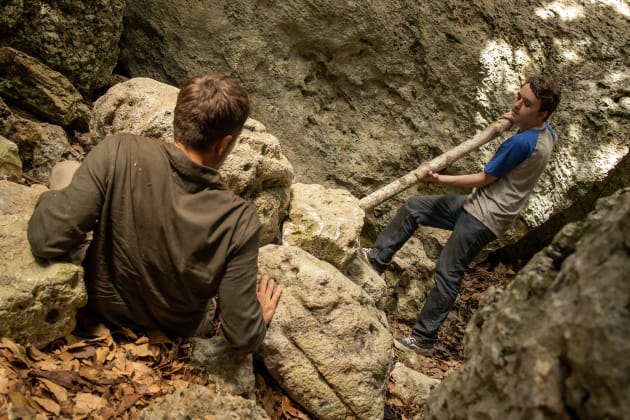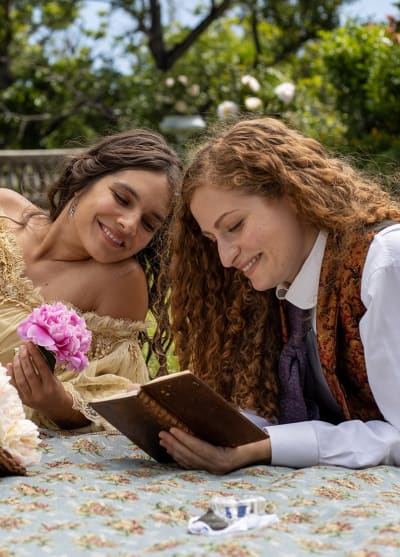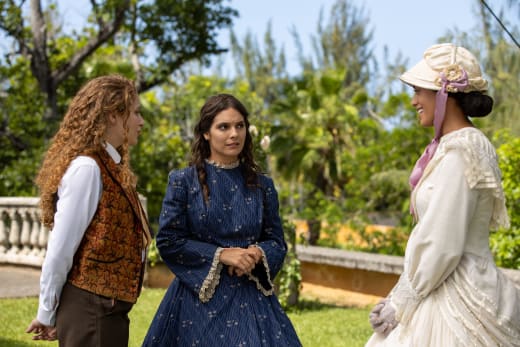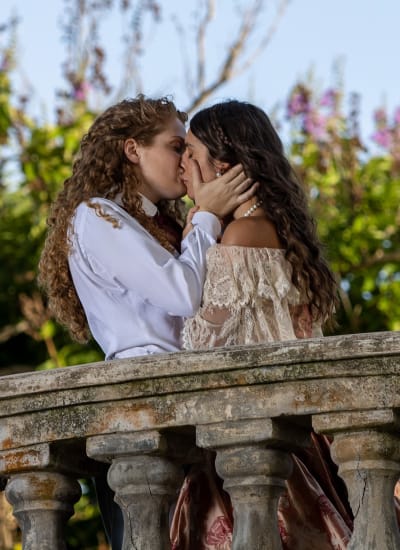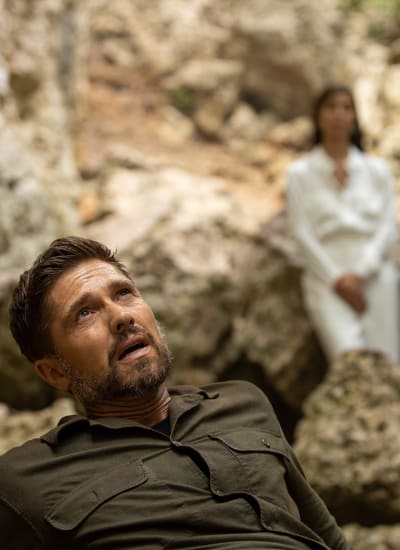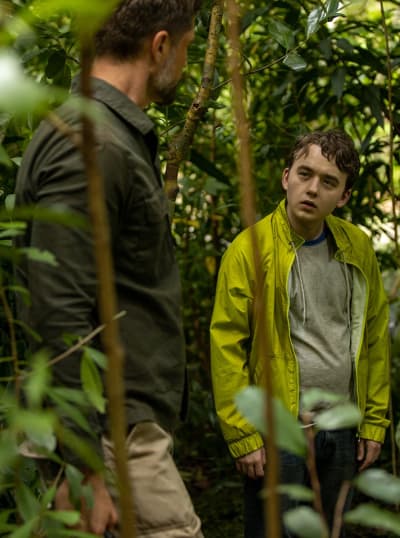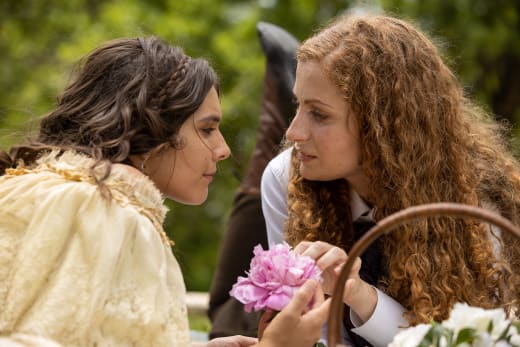If you squint a bit, you could argue that the unifying theme of Fantasy Island Season 1 Episode 7 (and maybe the whole season) is one of accepting one’s truth.
Otherwise, the storylines seem pretty disparate.
Survivalist faces death in the wild with his own younger self. Bookworm travels back in time and falls in love with her favorite author. It takes a bit of thought to get these concepts to dovetail.
I love the idea of a lover of literature finding the love of her life by sourcing the literature that fired her imagination (and other things).
However, I can’t help but feel Isabel’s wish to become more open to the real world ended up enabling her to hide forever in the past.
Isabel: I need to get a life, and I need to get my nose out of books. And I’ve tried before, but the world… it’s SO MUCH. And books are where I feel safe.
Elena: You don’t feel safe in the real world?
Isabel: I feel out of step, like I don’t really belong. And I’m worried my whole life is one big ‘no, thank you’ when I want it to be a ‘YES’!
Also, I’m a little uneasy with the idea that the island can send someone into the actual past. I think the island’s fantasies had always been sort of Westworld with magic instead of machines.
(Because, if everyone is real, who got roasted on that spit on Fantasy Island Season 1 Episode 1?)
And the island is meant to be a temporary, if edifying, escape, not a permanent and fundamental departure.
Of course, Ruby’s addition already tested that theory.
Real life can be intimidating. Getting lost in a good book? I mean, shoot, there’s nothing better. Especially if it’s romance.
Ruby
Did Isabel not have family or friends who would miss her? Would her employer not make inquiries when she doesn’t return to work?
There’s a lot of loose ends left when you rip someone out of their time, not to mention all the butterfly effect complications from her knowledge of the future now that she’s in the past.
Time-travel quibbles aside, Isabel’s fantasy is arguably the heavy-weight between the two presented.
It delivers a sweeping romance, a sense of destiny, and an intense level of chemistry.
The blossom scene was probably the most erotic flirtation I’ve seen on network television in decades. Both Caitlin Stasey and Gillian Saker give themselves to the moment with no reservation, conveying an overpowering attraction between their characters.
The two are so fixated on each other; I had to wonder what Reggie does with himself in this marriage of convenience?
I’ve gone hunting, and I’ve napped twice. What else is there to do?
Reggie
Or is that why he’s always looking for the maid? Hmmm. It wouldn’t be the most unheard-of household setup for the times.
I wonder if seeing Isabel and Rachel find each other will inspire Ruby to pursue a relationship with Gina. Or to seek out Meredith. Or that tattoo artist.
Much of this season’s long arc has to do with Ruby figuring out what to do with her second chance at youth. Understandably, her sense of fidelity to Mel holds her back. Fifty-plus years together is a hard thing to shake.
And just as Isabel had a hard time dealing with the hustle and bustle of the contemporary world, Ruby’s had a difficult adjustment to island life.
Rachel: My books are where I can truly be myself. I feel free when I write.
Isabel: Then we’re a good pair because I feel very free when I read.
Rachel: Wouldn’t it be nice if we could both feel free all the time?
Even if Mel wasn’t her grand romance, Ruby’s life felt complete and secure when she was with him.
Seeing how Rachel completed Isabel — spurring her to acts of courage and brilliance out of love — and even reading how Isabel affected Rachel as described in her Agnes novels, Ruby may feel brave enough to say, “Yes,” herself.
While Isabel rushes towards love, elsewhere on the island, Brian rushes towards death.
Seeking the greatest challenge only to discover it was inside himself the whole time. There’s something about the trope that smacks of pulp fiction.
Heh, I guess the plots dovetail pretty nicely on a meta-level.
Still, similar to Christine in the premiere, Brian’s psychological baggage is a heavy burden.
Elena: Given the circumstances, I hope that you will change your mind about wanting to be rescued.
Brian: Why would I do that?
Elena: The possibility of death comes to mind.
I do think his younger self comes across as pretty authentically, though.
Benjamin Stockham also bears a helluva resemblance to Frankie Munoz in his Malcolm in the Middle days, which probably helped convey the mouthy teenager vibe.
As Young Brian, there’s a solid contrast created between the wide-eyed youth and the man with a death wish.
I might be you, but I’m not a moron.
Young Brian
.
While the survivalist bits at the start of his fantasy didn’t make for particularly engaging viewing, I guess it was necessary to establish Brian’s intention to prove himself stronger than his environment.
As they drill into you in high school English courses, the protagonist can face conflict with another person, his environment, and/or himself.
In this odyssey, Brian Cole hits two of the three, and all because he failed to deal with the conflict, he barely survived with his high school bullies.
I appreciated that the messaging wasn’t that he should forgive his bullies (because they obviously deserve a hellish karmic bitch-slap for outright trying to murder a classmate) but that he should recognize his younger self as a survivor and not a victim.
Again, tying it back to the premiere illustrates a different part of the healing survivors of abuse and trauma need to undergo.
Until today, I thought I had a handle on you. Now, I’m realizing, not so much because I never thought you were someone who could face a situation like this without giving in to the fear.
Brian
So, ultimately, both Brian and Isabel come out of their fantasies as people more at ease with themselves.
Brian’s regained a love of life, with his new goal to win back his wife, while Isabel no longer has to contend with modern-day-induced motion sickness.
I’m still pondering the issues with time travel, but I’ll admit it was a narrative in keeping with something R.C. Goldwater might’ve written.
As you watch Fantasy Island online, did you find yourself swept away by the romance of it all?
Or did you question the logistics of the premise?
Is escapism successful if you’re distracted by the “What if?”s and “What about…”s?
Hit the comments with your rants and raves!
Diana Keng is a staff writer for TV Fanatic. Follow her on Twitter.

